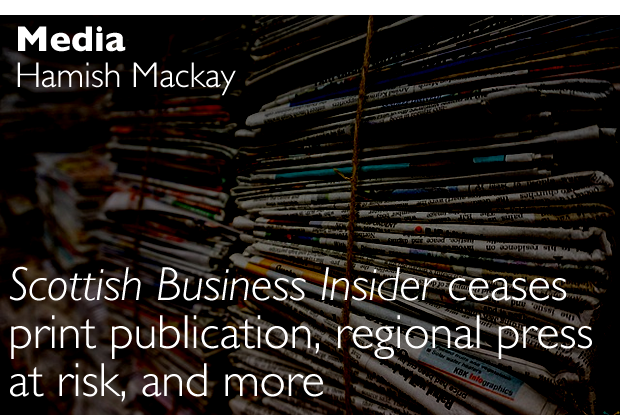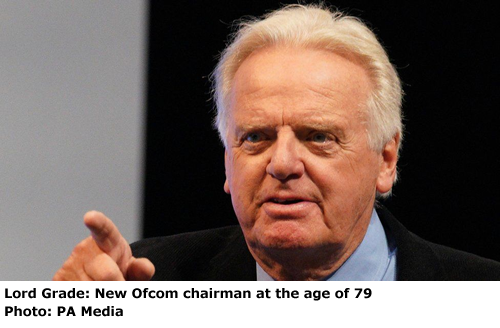
1. Scottish Business Insider magazine ceases print publication
The demise of Scottish Business Insider glossy A4 magazine, after a 38-year-long publication run, has prompted its most recent editor to declare that he is convinced that there is a market for a new ‘thoughtful’ quality business magazine in Scotland.
Scottish daily news website, Daily Business, reports that the print version of Scottish Business Insider has been closed down by its publisher Reach plc, ‘apparently a victim of rising newsprint and other costs’, ‘but many believe it was never a comfortable fit with a stable of tabloid newspapers’.
Reach plc is one of Britain’s biggest newspaper groups, publishing 240 regional papers in addition to the national Daily Mirror, Sunday Mirror, The Sunday People, Daily Express, Sunday Express, Daily Star, Daily Star Sunday, as well as the Scottish Daily Record and Sunday Mail.
Scottish Business Insider was launched as an independent monthly magazine in Edinburgh back in 1983 by two prominent and enterprising Scottish journalists, Alastair Balfour and Ray Perman, whom subsequently sold it to Trinity Mirror (now Reach plc) in 1999.
Daily Business reports: ‘The magazine ceased being published in print during the early months of the pandemic but hired Kenny Kemp last year as editor to publish four print editions following the departure of Ken Symon. Total distribution of the magazine was about 7,000 after the company ceased distributing bulk copies to airports, trains and other outlets. Insider has also organised a number of awards and other events but Reach is said to be committed only to the Deals and Dealmakers brand. Earlier this month [May] Reach said the group was feeling the squeeze of higher costs and has accelerated its efficiency plans’.
Daily Business goes on to explain: ‘Kemp spelled out his frustration at the closure of Insider in a social media comment’. It quotes Kenny as pointing out that: ‘Scottish Business Insider magazine did not fit with the company’s wider search for digital clickbait and celebrity trivia. So it has shut after 38 years. Very, very sad’.
Kenny declares: ‘Scotland requires independent and balanced business reporting now more than ever. I am convinced that a quality magazine that is thoughtful can survive in Scotland, supported by our professional classes. Like many things, the magazine had been trying to recover from Covid-19, and now faces rising print costs. A reduced online operation will continue under the Scottish Business Insider banner’.
And, he sadly concludes: ‘We can’t blame Reach for their commercial decision, but I have to reflect, as the final editor of an illustrious line, that Scottish Business Insider was in the wrong ownership hands’.

2. Editor’s cash plea on behalf of regional press
The editor of leading regional daily, The Yorkshire Post, has warned that the UK’s regional press will become a ‘homogeneous mass of titillating bubblegum’ unless they attract further financial support from their readerships.
Media industry website HoldTheFrontPage (HTFP) reports that James Mitchinson has made the claim as he shares his fears that regional news is ‘at risk of becoming a victim of click trends’.
Mitchinson’s concern comes after his previously stated belief that current advertising models â based on page views â have led to a ‘race to the bottom’ for some publishers.
Posting on Twitter, he warns readers: ‘High-quality, meaningful regional news is at risk of becoming a victim of click trends â rendering it a singular homogeneous mass of titillating bubblegum if we are not careful. We are trying to hold the line, but we know we need you to protect us’.
This is not the first time that the the editor of the Leeds-based publication has spoken out against the advertising model as a means of increasing digital revenues. HTFP reported two years ago how Mitchinson had called for the establishment of both a new ‘conscientious advertisers’ network’ and a ‘responsible publishers’ network’. His concept was to see these two groups working in tandem to encourage public interest journalism, with big advertisers taking a ‘conscientious decision’ to support trusted brands that publish responsibly.
At the time, he declared: ‘I have long been convinced that the indiscriminate nature of the programmatic advertising business model makes it vulnerable to exploitation. It has caused a race to the bottom, with some publishers â not all â and editors gaming the business model with their commissioning decisions rather than thinking about what is in the public interest. When that happens, editorial decisions are steered by pure economics rather than robust, creditable editorial principles’.
Meanwhile, HTFP also reports that local news titles â particularly those serving medium-sized towns â risk ‘going to the wall’ without further government support, according to Newsquest’s chief executive Henry Faure Walker. Newsquest, a major UK media group, publishes a clutch of newspapers in Scotland including The Herald, Glasgow Times, The National and several weekly titles.
Faure Walker has issued the warning to UK Government ministers following the decision by some regional publishers to unite in calling for greater intervention from Westminster to financially aid the newspaper industry.
Companies including Newsquest, Reach plc, the Midland News Association and Baylis Media have rallied behind proposals by trade body, the News Media Association (NMA), to help secure the short-term future of regional titles across the UK.
The NMA is demanding action from the UK Government including a package of ‘targeted, short-term financial measures to support the transition of local publishers to digital-first business models’.
HTFP points out: ‘Such a package would include extending local newspaper business rate relief and introducing new tax reliefs for journalism and advertising’.
The proposal has been made in a submission to the Digital, Culture, Media and Sport (DCMS) Select Committee’s inquiry into the sustainability of local journalism. Other proposals made by the NMA include maintaining the statutory obligation to place public notices in printed local newspapers.
3. Can he make the grade at the age of 79?
I must admit to some surprise that Conservative life peer, Michael Ian Grade, Baron Grade of Yarmouth, CBE (born 8 March 1943) has, at the grand old age of 79, been appointed as the new chair of UK media regulator Ofcom. His spell as chairman will run until 30 April 2026 and he will earn an annual £142,500 for the three-days-a-week role.
MPs on the DCMS Select Committee declared they were ‘impressed’ by Grade when he appeared in front of them, observing that he brought much experience from the media and broadcasting world, and that they wholly approved of his promise to keep his opinions ‘at the door’ and stay out of potential discussions on the BBC licence fee, the possible privatisation of Channel 4 and his ‘strong’ views on ‘woke warriors’.
However, they conceded that he will need support in discussions on any major online issues after he readily admitted he does not use social media (other than using WhatsApp to communicate with family members), this despite him now heading the very organisation which is tasked with regulating the giant tech platforms.
I have no issues with Grade’s ability to lead Ofcom. After all, he has held a number of senior roles in television, including controller of BBC1 (1984-1986), chief executive of Channel 4 (1988-1997), chairman of the BBC’s Board of Governors (2004-2006) and executive chairman of ITV plc (2007- 2009).
Since 2011, Grade has been a Conservative Party life peer but he now moves to the crossbenches in the House of Lords on taking up his new role at Ofcom.
Grade, who has previously accused Ofcom staff of being ‘woke warriors’, told the MPs: ‘Ofcom’s enviable reputation as a regulator is based on their processes; their adjudications are based on evidence and research; and, therefore, you leave your opinions at the door when you arrive at Ofcom’.
He added somewhat thoughtfully: ‘I have strong opinions sometimes⦠One single person’s opinion in Ofcom, whether it is my opinion or other members of the board, will contribute to the debate, but one voice is not powerful in Ofcom nor should it ever be â certainly not the chairman’s voice’.
On tackling the tech giants, Grade observed: ‘I think the laws of nature suggest they will resist regulation. They are used to having their own way: it is a Wild West in a sense⦠The time has come for effective regulation. And I think Britain is at the forefront of this’.
However, at the risk of being accused of ageism, I must point out that by the end of his chairmanship, the good Lord will be aged 83. With a battle with tech giants of the might and calibre of Google and Meta (Facebook) looming, I feel Grade might simply be too old for such a challenging and demanding role. I really wish that the MPs had sought out a younger person. There must be a number of media folk out there who could meet the necessary criteria.

4. The Northern Echo believes in speaking its mind
The Northern Echo regional daily newspaper certainly believes in speaking its mind when it feels it must. Reporting on a poll which revealed that 66% of its readers seek Prime Minister Boris Johnson’s resignation over the Partygate scandal, the Darlington-based Newsquest-owned title has won widespread media industry praise after it ran a picture of the PM alongside a front-page splash headline: ‘Blood on your filthy privileged hands’ â paraphrasing the words of Andy McDonald, Labour MP for Middlesbrough, in the House of Commons.
An angry Simon Clarke, chief secretary to the Treasury and Tory MP for Middlesbrough South and East Cleveland, denounced the front-page denouement as: ‘Absolutely incredible. The Echo repeating a Labour MP’s deeply distasteful, hate-filled rant as their front page. However strongly people may reasonably feel about events in Downing Street,’ protested Clark, ‘this is grotesque and does nothing more than pander to the worst excesses of Twitter’.
But The Northern Echo’s editor, Gavin Foster, is unrepentant, and defended his front-page splash by telling HTFP: ‘This front page and our coverage, both on our website and in print, is simply about standing up for what is right and wrong. Despite the damning evidence in the Sue Gray report, Boris stood up in front of the [House of] Commons and once again delivered a back-handed apology â still trying to hide behind a veil of⦠I didn’t know I was doing anything wrong. Right-thinking people in the North East have had enough. What went on in Downing Street was clearly a culture throughout the pandemic that was morally abhorrent, overseen and accepted by our Prime Minister. By his own admissions changes have been made to stamp out such behaviour. It’s simply indefensible’.

5. Viewers deserting Piers Morgan’s new TalkTV show
The Scottish Daily Mail (SDM) reports that Piers Morgan will be taking a month off from presenting his contentious TalkTV show, Piers Morgan Uncensored, as a result of a pre-scheduled holiday break along with filming commitments for a true crime documentary series.
The SDM claims that Morgan’s new programme is struggling to attract the same audiences that tuned in when it was launched on Rupert Murdoch’s fledgling global TalkTV news and current affairs channel, reporting: ‘The former Good Morning Britain star, 57, averaged more than 300,000 viewers for his debut episode on 25 April, in which he interviewed Donald Trump. But since then the figures have plunged, with recent episodes getting about 30,000 viewers’.
Morgan has very publicly signed a contract with the Rupert Murdoch media empire for global TV and radio input to News Corps and Fox News, including TalkTV shows; series and documentaries; podcasts; newspaper columns for The Sun and The New York Post, and authoring books.
The former editor of both the now-defunct News of the World newspaper and Daily Mirror has reputedly signed a three-year contract worth £50m which makes him by far the UK’s top paid journalist and broadcaster.
Should you wish to get in touch with me, please email me at: mackay858@btinternet.com
Caithness-born Hamish Mackay is now in his 57th year as an occasional/sometimes regular contributor to the UK’s exceedingly diverse media market